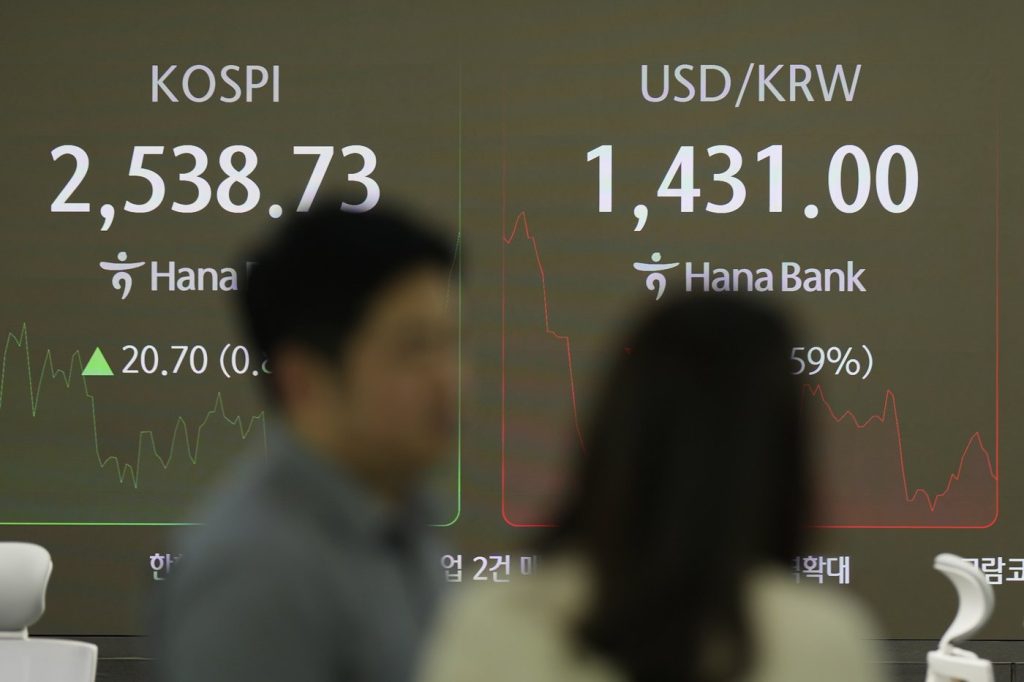HONG KONG (AP) - Asian stocks exhibited mixed performance on Wednesday amid rising uncertainty surrounding U.S.-China trade relations, particularly after recent comments made by U.S. President Donald Trump regarding tariffs. Following Trump's decision on Monday not to pursue significant tariffs on China, investors initially felt a sense of relief. However, uncertainty returned when Trump announced on Tuesday that he was contemplating a 10% punitive duty on Chinese imports, citing concerns over fentanyl smuggling from China into the U.S. through Mexico and Canada.
In the Hong Kong market, the Hang Seng Index fell by 1.1%, closing at 19,888.12, while the Shanghai Composite Index recorded a drop of 0.7%, settling at 3,805.78. Conversely, the Nikkei 225 Index in Tokyo saw a positive response, increasing by 1.5% to reach 39,604.71. This rise can be attributed to Trump's announcement of a joint venture aimed at investing up to $500 billion in artificial intelligence infrastructure. Following this development, shares of Softbank Group Corp., listed in Japan, surged by 8.9% on Wednesday.
Additionally, Taiwan's Taiex Index enjoyed a gain of 1.4%, buoyed by the AI investment discussions, with Taiwan Semiconductor Manufacturing Corp. (TSMC) experiencing a 2.7% rise in its share price. South Korea's Kospi Index also reflected positive momentum, adding 0.7% to reach 2,535.30, while Australia’s S&P/ASX 200 rose by 0.3% to finish at 8,428.70. Meanwhile, U.S. futures were higher, and oil prices demonstrated mixed results.
On Tuesday, the S&P 500 Index climbed by 0.9%, closing at 6,049.24, while the Dow Jones Industrial Average rose 1.2% to 44,025.81, and the Nasdaq Composite added 0.6% to reach 19,756.78. Trump's return to the White House has prompted concerns over his promise of sweeping changes to reshape global trade policies, many of which could negatively impact other countries. Despite the president's bold statements, stock indexes in both Asia and Europe experienced only modest movements.
In the bond market, U.S. Treasury yields surrendered some of the significant gains they had accumulated in recent months, which had increased pressure on global stock markets. The yield on the 10-year Treasury note fell to 4.56% from 4.62%, reflecting an easing trend. Notably, the 10-year Treasury yield has remained elevated since a September low of below 3.65%.
Morgan Stanley strategist Michael Wilson indicated that movements in long-term interest rates continue to be a primary driver for the overall U.S. stock market. He anticipates that the pattern of stocks dropping when yields rise—and vice versa—will persist until the 10-year Treasury yield sustainably falls below 4.50%. In cryptocurrency news, Bitcoin experienced a pullback from its record high above $109,000 set on Monday, trading at $105,742 on Wednesday, according to CoinDesk.
In terms of currency fluctuations, both the Mexican peso and Canadian dollar declined against the U.S. dollar, particularly after Trump expressed intentions to implement 25% tariffs on goods from Canada and Mexico beginning on February 1. The prospect of widespread tariffs, along with other potential government policies that could escalate U.S. national debt, has contributed to the rise in Treasury yields, intensifying the pressure on stock prices.
As for oil prices, benchmark U.S. crude dipped 6 cents to $75.77 per barrel early on Wednesday, while Brent crude, the international standard, gained 3 cents, reaching $79.32 per barrel. In currency markets, the U.S. dollar appreciated against the Japanese yen, rising to 155.85 from 155.46 yen, while the euro declined to $1.0413 from $1.0433.
In summary, the complex interplay of U.S.-China trade tensions, fluctuating stock and bond markets, as well as developments in the cryptocurrency and oil markets, are keeping investors on edge across Asia and beyond.










